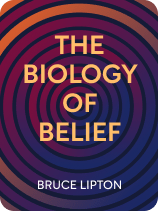

This article is an excerpt from the Shortform book guide to "The Biology of Belief" by Bruce Lipton. Shortform has the world's best summaries and analyses of books you should be reading.
Like this article? Sign up for a free trial here.
How are the mind and body connected? How do your thoughts influence your cells?
While some people believe that your thoughts can’t have a direct effect on your cells’ environment, Bruce Lipton’s book The Biology of Belief says differently. In fact, your mood and stress level can create a harmful environment for your cells, affecting you physically.
Let’s dive into this mind-and-body connection, and how it works.
Your Thoughts Contribute to Your Cells’ Environment
The idea that thoughts can have a direct effect on the material world has been largely rejected in the scientific worldview since the 1600s, when French philosopher Descartes proposed that the mind and body are distinct realms. The suggestion that your beliefs can affect your body has typically been dismissed as magical thinking, and Lipton recounts facing such reactions himself. But he says science now solidly confirms there is a mind and body connection that makes them inseparable.
Lipton explains that the mind-body dynamic works like this:
- Your mind perceives what’s happening around you.
- Your brain cells interpret that information and respond by secreting chemicals.
- Those chemicals circulate through your bloodstream to your whole body, becoming the environment in which all of your cells operate.
- How your cells operate in response to those chemical signals influences how you’ll behave and determines your overall health and well-being.
Lipton explains that the neurochemicals created in your brain are constantly affecting your cellular community. One of the ways this can negatively impact you is through the toxic chemical environment created by chronic stress.
Stress and Fear Create a Toxic Environment for Our Cells
Stress is the body’s response to any kind of threat, real or perceived. This means the stress response can be seen as a direct link between mind and body.
As Lipton describes, a threat is perceived and interpreted first by the mind, which then sends chemical signals to the body’s systems for a response. When the brain perceives any kind of threat, the hypothalamus, pituitary, and adrenal glands (“HPA axis”) secrete hormones, including cortisol. And the sustained release of cortisol throughout your body has damaging health consequences.
According to Lipton, when your body is flooded with cortisol on a sustained basis, your cells are constantly receiving messages that their environment is hostile. This changes the way the cells behave because they have to direct energy toward self-defense mechanisms rather than toward healthy function and growth. This is why chronic stress inhibits your immune system, for example. The body directs all its energy toward the threat response, leaving it depleted of energy for other functions.
The problem, Lipton explains, is that the “threats” we tend to perceive in the modern world are often not the kinds our bodies are evolved to deal with. What’s worse is that we’re usually not even consciously aware of what the problem is, or we’re not in a position to fix it—often because it’s a result of subconscious programming, which we’ll discuss later.
| Chronic Stress Is Killing Us Why Zebras Don’t Get Ulcers by Robert Sapolsky and When the Body Says No by Gabor Maté explore the connection between stress and disease. Both authors argue that chronic stress can have a devastating effect on our physical and mental health. Sapolsky explains that while animals like zebras experience acute stress in response to immediate threats, such as having to outrun a lion, humans in modern society tend to experience chronic stress from sources such as traffic or poverty. This chronic activation of the stress response can lead to a range of physical and mental afflictions, including depression, ulcers, colitis, heart disease, and more. Similarly, Maté argues that when we are unable or unwilling to say “no” to pressures in our life, our body may do it for us by creating illness. He suggests that many chronic illnesses are linked to stress caused by our modern lifestyles, our conditioning as children, and our psychological coping mechanisms. Both authors suggest that by being mindful of our thoughts and beliefs and finding ways to manage stress, we may be able to improve our physical health. |
The Placebo Effect
Lipton points out that for over 50 years, scientists have known conclusively that the mind affects the body’s health. This mind-body relationship first became clear through research on the placebo effect—a phenomenon in which people experience healing when given a fake medication with no active ingredients. This means that for some people, simply believing in a medication is enough to heal them.
Lipton goes on to explain that studies of antidepressants routinely show that the drugs work only minimally, if at all, better than the placebo effect. In fact, these studies have demonstrated that some portion of participants experiences relief from their depression after taking a pill containing no medication at all. Lipton points out that, based on this, some psychiatrists have actually suggested that a placebo should be the first line of treatment given to those suffering from mild or moderate depression, because if this works for some people, then there’s no reason to subject them to the potentially harmful side effects of the real drugs.
In a 2002 study, patients were even healed after being given a placebo surgery. Patients with debilitating knee pain were divided into three groups. The first two groups were operated on using two different techniques to determine which was more effective. For the third group, the surgeon made the typical incisions and then stitched them back up, so it would appear that the patient had had surgery, but he performed no surgery at all. The results shocked the surgeon: All three groups reported the same degree of improvement. At a follow-up two years after the surgery, the participants who had not received the surgery were still not aware, and they all continued to have increased mobility and decreased knee pain.
Lipton suggests that science needs to concentrate more effort on understanding this phenomenon because if we could learn how to intentionally leverage the placebo effect, we could heal many more patients without pharmaceutical or surgical intervention.
| Harnessing the Power of Placebos It would likely be considered unethical for a doctor to prescribe placebos deceptively to patients, but some argue that it’s equally unethical to prescribe antidepressants, since research has shown that they often don’t perform any better than placebos in trials. This means antidepressants effectively are placebos—meaning if the same percentage of people get better with antidepressants as with placebos (as studies show), then those on antidepressants are likely experiencing the placebo effect, not an actual physiological remedy. And since antidepressants often come with much more potentially severe side effects, including increased suicidality, it could be more ethical to simply prescribe placebos. But since the deception of patients is not generally acceptable, it has also been suggested that doctors could prescribe placebos non-deceptively by telling patients they’re getting a placebo. The assumption that placebos must be presented deceptively in order to be clinically effective has been debunked by recent trials. Non-deceptive presentation of placebos, accompanied by an explanation of their effectiveness, has proven to lead to successful outcomes. A 2017 study looked at five different trials in which patients were prescribed placebos non-deceptively for irritable bowel syndrome, depression, allergic rhinitis, back pain, and attention deficit hyperactivity disorder. In these trials, doctors told patients the medication they were getting was a placebo with no active ingredients and explained to the patients that placebos can be very powerful and effective. In all five studies, those given the placebos improved at a higher rate than those who received no treatment. |

———End of Preview———
Like what you just read? Read the rest of the world's best book summary and analysis of Bruce Lipton's "The Biology of Belief" at Shortform.
Here's what you'll find in our full The Biology of Belief summary:
- That your mindset matters more than your genetics when it comes to health
- How your thoughts affect your immune system and hormones
- Why humans should join together in a community to aid survival






